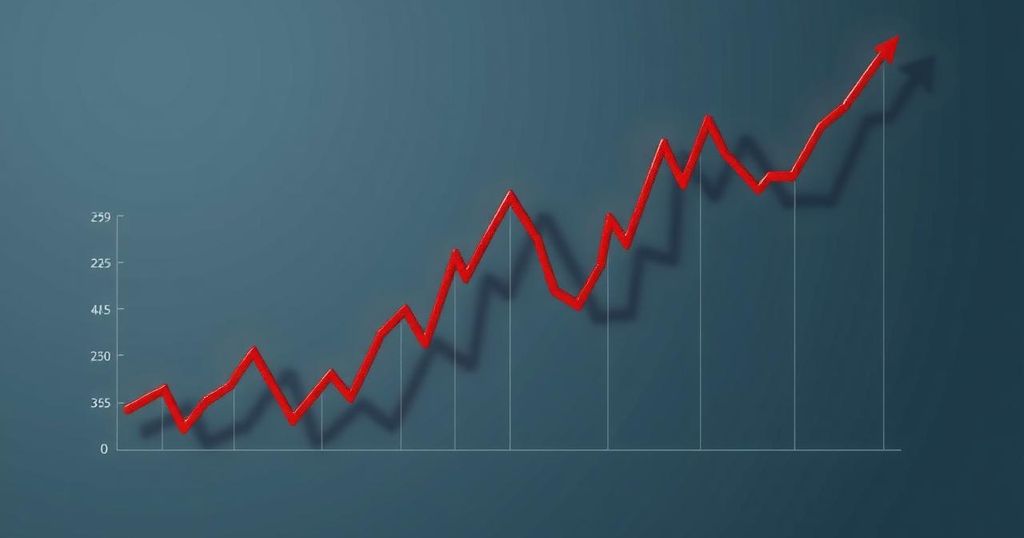Bursa Malaysia’s benchmark index finished lower due to selling in construction and banking sectors, despite some activity in healthcare stocks. The FBM KLCI dropped by 10.15 points to 1,517.66 amid concerns over geopolitical tensions and market dynamics. Analysts expect the index to trade between 1,500 and 1,530 for the week, highlighting potential buying opportunities in undervalued stocks.
Bursa Malaysia experienced a decline as the benchmark index closed lower, primarily due to selling pressure in the construction and banking sectors. Meanwhile, healthcare stocks observed an uptick in buying interest. According to Thong Pak Leng, Vice-President of Equity Research at Rakuten Trade Sdn Bhd, the FTSE Bursa Malaysia KLCI (FBM KLCI) fell owing to a deficiency in buying catalysts.
The FBM KLCI declined by 10.15 points, a reduction of 0.66 percent, finishing at 1,517.66 as compared to 1,527.81 from the previous day. It began the day at 1,513.29, oscillating between 1,512.21 and 1,523.39. The overall market saw more losers than gainers, with 449 declines against 428 increases, and turnover dropped to 2.92 billion units valued at RM2.73 billion.
The exchange was closed previously for the Nuzul Al-Quran public holiday. Furthermore, heightened vigilance concerning potential tariff escalations lingered, as Donald Trump reiterated his threats of retaliatory trade measures, coinciding with ongoing discussions for a US-mediated peace agreement between Russia and Ukraine. The inability of the benchmark index to hold above 1,520 has raised expectations of support at the 1,500 level.
Mohd Sedek Jantan, Head of Investment Research at UOB Kay Hian Wealth Advisors, indicated that Wall Street’s decline was attributed to caution ahead of the Federal Open Market Committee (FOMC) meeting. He noted that market conditions have begun stabilizing compared to the previous week. Both commodities and utilities sectors displayed positive movements.
The overall sentiment was further influenced by Indonesia’s stock market decline, driven by revenue drops that posed risks to its fiscal health and economic growth, consequently affecting Malaysian stocks. Additionally, the Bank of Japan maintained its interest rate at 0.50 percent, as anticipated.
On the heavyweights, Maybank decreased by six sen to RM10.36, while CIMB fell by 32 sen to RM6.93. Public Bank and Tenaga remained unchanged at RM4.54 and RM13.56 respectively. IHH Healthcare’s stock rose by one sen to RM7.10. Active performers included Pertama Digital, which grew by six sen to 17 sen.
Indices reflected negative trends, with the FBM Emas Index down by 60.42 points to 11,364.06. The FBMT 100 Index likewise narrowed by 66.10 points to 11,121.69. Although certain indices like the FBM ACE Index saw improvement, the financial services sector lost significant ground, dropping by 183.70 points to 18,612.44.
In volume statistics, the Main Market saw an increase to 1.48 billion units worth RM2.46 billion, while warrant turnover decreased. The ACE Market volume reduced significantly. Consumer products and service sectors dominated trading, highlighting varied activity across different indices of the market.
In summary, Bursa Malaysia’s benchmark index experienced a downturn, attributed to selling in the construction and banking sectors. Despite interest in healthcare stocks and an overall reduction in turnover, concerns remain regarding international geopolitical tensions and local market dynamics. Analysts predict that the FBM KLCI may remain between 1,500 and 1,530 in the weeks ahead due to potentially undervalued strong stocks. The market remains vigilant amid external influences and uncertain economic indicators.
Original Source: www.thestar.com.my




